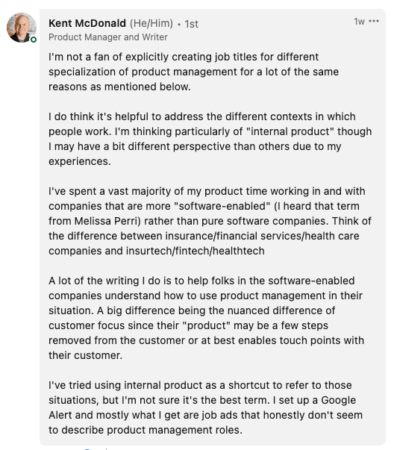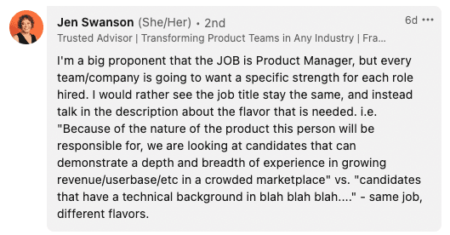
Product management specializations have trended upwards in recent months. These “specializations” often place focus around a specific set of skills or needs a company has, somewhat creating a division within the product manager role.
This got me thinking a little bit, and I started asking myself – is this really necessary? Are we breaking apart the product manager role a bit too much?
If you’re thinking about your career path and how this may affect your next steps, here’s a round-up of what I found out.
Summary of product management specializations
As always, here’s your TLDR if you’re in a rush.
- All product managers share a base, common skillset, which includes problem-solving, strategic thinking, and empathy for others.
- The different specialization categories: core product manager, growth product manager, technical product manager, platform product manager, and innovation product manager.
- Take into account company maturity when choosing your next role. Scale-ups and digital transformation companies are not the same.
- The future of product management specialization: will this remain? Likely, but in larger companies.
Product Management Skills
Before I take a dive into these different product management specializations you should be looking at when building up your product team, it’s worth noting that at their very core, all product managers have the same set of responsibilities and skills.
These include:
- Knowing how to carve and clearly communicate a product strategy, and apply strategic thinking when making decisions.
- Have exceptional communication, writing, and above all, listening skills.
- Have an increased EQ and be empathetic towards customers, teams, and stakeholders.
- Run continuous market research, discovery, and/or user research to better understand how to solve problems.
Kent McDonald summarized this beautifully, saying that the context of the work may change, but the core and basic knowledge remain.
Which Product Management Specialization is Right for you?
This is by no means a definitive list but based on some research, and after speaking to some product managers, I’ve been able to somewhat define the following groups:
- Core Product Manager
- Growth Product Manager
- Technical Product Manager
- Platform Product Manager
- Innovation Product Manager
Let’s take a deep dive into these specializations and what they entail.
Core Product Manager
This is likely the role we are all familiar with the most in the product management community.
A product manager building a SaaS product of some sort, working in Agile software development practices. These product managers work heavily with other teams, and act as the “builders of bridges,” so to speak.
Marty Cagan refers to them as “Experience Product Managers” in his book Inspired, as they primarily focus on human-centered, customer-focused products.
Growth Product Manager
Growth PMs, as the title itself explains very clearly, are heavily focused on the product’s growth strategy.
Their goals are generally to expand feature adoption and discovery, increase retention rates, and monetize/gamify the experience further.
These product managers, alongside Core PMs and Innovation PMs, have the benefit of being able to run various continuous experiments and more hypothesis-driven development within their teams.
To achieve these objectives on mobile platforms, they can onboard and engage mobile app users by creating personalized messaging, push notifications, and surveys.
Technical Product Manager
Technical Product Managers (TPMs) focus on highly technical products and have those considerations upfront as they’re coming up with potential solutions to problems.
Whereas consumer-facing product managers are perhaps less “technical”, these types of PMs need to fully understand the technologies they are building for.
There are generally two categories:
- A TPM who is hands-on technically-oriented (like a senior developer who has taken on product responsibility)
- A TPM of a technical team or domain, who doesn’t need to be personally hands-on technical but should be at least conversant with key principles involved, such as domain architecture, uses of APIs and connectors, and different platforms and technologies.
Platform Product Manager
As a platform product manager, you build the fundamental tools that other teams will build on top of.
You will spend some time looking at their roadmaps finding the common technical problems they face trying to build consistent solutions, and asking yourself the following questions:
- Can you build common patterns to help support their work?
- Are there commonalities in technology that help your company build solutions faster, and
- Are there easy paths for storage, ci/cd, identity, resources (etc)?
Responsibilities include building operational tooling to better solve root causes, building tools for specific business units so they are able to do their jobs with more reliable data, rearchitecting back-end tables to allow for faster and more reliable analytics (to name a few).
Innovation Product Manager
I found this one personally quite interesting, as the focus for these product managers overlap a lot with what a product marketing manager (PMM) does.
These types of PMs focus on finding product-market fit for new experiments and opportunities within an organization.
The slight difference between an Innovation PM and a PMM would be that an Innovation PM does not have to do things like build sales collaterals, create helpful content or train their internal teams.
Their sole focus is to ask the question: will this new product fit our existing market?
Product Managers and Company Maturity
The real difference in product manager roles is not just down to the focus itself or the particular specialization behind it, but it’s also important to consider the company’s maturity.
A product manager in a startup will not have the same challenges as one in a scale-up or even one going through digital transformation in a large enterprise company.
In the words of Jen Swanson, the nature of the role also needs to be considered with the breadth of experience in a given vertical.
The job in many ways is the same, but the struggles and overall experience will be slightly different.
Let’s consider now two very different situations:
A product manager with a focus on consumer-facing products in an Agile environment
These are the product managers we’ve all grown to know and love.
They understand product growth, work with continuous feedback loops, run competitive analyses, and assess potential new product ideas.
For these product managers, there isn’t a lot of internal friction when it comes to focusing on either PLG or implementing outcome-focused work.
*Of course, this is a bit of an assumption. If you’re struggling with this, let’s talk!
A product manager with a focus on internal/external products in a Digital Transformation environment
These product managers may focus on either internal or external-facing products, but the entire organization is going through a digital transformation and want to move from a project-based approach (that is, waterfall) to a product-based approach (Agile.)
These organizations often work with an Agile coach, and the PM plays a role in helping establish workflows and processes to help with that transition, educating everyone on how to be more outcome-focused.
If you are thinking it – yes, these are also unfortunately the type of companies that may end up employing frameworks like SAFe, but that’s a topic for another day.
Different Approaches, Same Job
In this blog post, Gabriel Steinhardt describes these “specializations” as just being different approaches to the same job.
There is the Generalization Approach that
“describes product management as a collection of diverse responsibilities that may include tasks offloaded from other corporate functions. It also describes product management as the backbone, connective tissue, or glue that holds together all aspects of a product project.”
This again refers to the generalist PMs as described above, and likely even an internal product manager if they’re focused on specific internal products.
The Business Approach, in comparison
“is heavily focused on the product’s business aspects with a broad emphasis on all monetary issues.”
This refers to the innovation, growth, and any other verticals that impact the business metrics directly.
Lastly, the Technology Approach
“considers product management as an extension of product development and, at times, even subservient to product development.”
In this vertical, we have a potential platform and technical product managers who must be well-versed in the technologies they are building for.
The Future of Product Specializations
Will these labels prevail? Maybe.
Basically, “it depends.” (Yes, you know I’d say that!)
These various specializations seem to have a place in larger companies, where these divisions of work are needed due to the size of the company. In smaller organizations, the “generalist” product manager role will continue to prevail.
In the words of Austin Yang:
My prediction: Like any role has gone through, there will be more specializations among the PM role, but such need will only exist at larger companies. It’ll also be easier for a PM to jump between specializations vs other functions (frontend > backend developer, SEO > Paid marketer, etc)
If you are worried you must specialize in something – don’t.
You do not need to learn how to code (unless you want to be a Technical PM!) and you don’t need to be an SQL superwiz – but these things certainly can come in handy.
At the end of the day, as a product manager, you should be able to navigate various contexts and situations. There is a reason we are called generalists, and that’s because, at the core of it all, we are.
[Feel free to send this to your hiring managers.]











